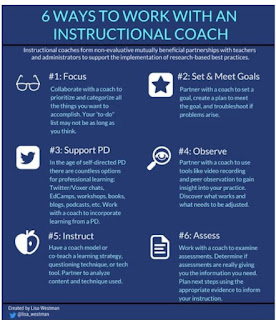Are you coachable?
I believe one way to alleviate the stress that accompanies the coaching process, is to present the opportunity in a more co-teaching format. If a new teacher is eager, then the coaching system is more welcomed. However, a seasoned teacher may get offensive unless it's presented in a manner that makes them feel that they will be enhancing their teaching ability.
In my current coaching relationship, my coachee approached me after attending one of my tech tools summer PD. I offered to help any and all teachers that would like to develop an engaging classroom environment by using tech tools. This allowed the teachers to participate in a teacher-initiated coaching opportunity. Additionally, this helped to identify the seasoned teachers that were willing to learn about tech tools and their readiness for change. Marzano and Simms (2013) suggests that in order for the teachers to be more receptive there must be a motivation and a desire to want to learn. Those two elements are the foundation for a positive coaching relationship, between teacher and coach. After I completed my coaching relationship, I was hoping for more teachers to join in a coaching experience. After a few teachers saw the advances my coachee made with her daily instruction, they were more open to receive help from our current instructional coach. I also discovered that teachers with classroom management issues are eager to learn ways to engage their students using technology, but also how it will improve their classroom management system. However, studies have shown that instructional coaches are being stressed out and overworked. So schools must strategize in order to continue to use them effectively. According to Delinger and Brooks (2018) “coaching initiatives must be designed to maximize the time coaches spend working with teachers to improve instruction” ( p. 22). If a school decides to hire an instructional coach, then a schedule that will accommodate all of the expectations must be created. An instructional coach must know exactly what is expected and a schedule that will allow the expectations to be attained.
References
Kane Britnie Delinger, & Rosenquist Brooks. (2018). Making the most of instructional coaches. The Phi Delta Kappan, 99(7), 21.
Marzano, R.J., & Simms, J.A. (2013). Coaching Classroom Instruction.The classroom strategies series. Bloomington, IN Marzano Research.
Reiser,T. (2015, July 12). What is the Role of an Instructional Coach? YouTube. https://youtu.be/mokw9aFWDWg
Westman, Photo. blogs.edweek.org




Jasmine,
ReplyDeleteSo many times teachers need to see from other teachers that something wasn't "that bad". It sounds like your coachee was the example for other people in your school. I think teachers are sometimes afraid to ask for help because they think it will add too much work to their already full plate or they are afraid they will be judged. Thronton et al. (2020) looked into how leadership affects teacher self efficacy. "Effective praise, modeling of the vision, database decision-making and positive relationships with teachers can positively influence teachers beliefs that we can do this or that I can meet expectations." Aguilar (2013) states, "Education is a deeply emotional arena for just about everyone who enters it--the beauty of coaching is that we are uniquely positioned to help these be positive emotional experiences where healing and transformation are possible" (p. 242).
References:
Aguilar, E. (2013). The art of coaching: effective strategies for school transformation. San Francisco: Jossey-Bass.
THORNTON, B., ZUNINO, B., & BEATTIE, J. W. (2020). Moving the Dial: Improving Teacher Efficacy to Promote Instructional Change. Education, 140(4), 171–180.
Johanna,
ReplyDeleteWhat a topic to discuss! I always like to read about how to coach the uncoachable. I am very interested in how to coach the seasoned teachers who don’t feel they don’t need to grow. Aguilar (2013) mentions The Ladder of Inference. This model helps coaches let the teachers see the coaching model for themselves. One example of this would be me observing a teachers classroom for ten minutes and noticing that students are shouting out answers and there’s junk in the back of the classroom. Once I leave the classroom, I have a preconceived notion that the teacher needs classroom management help. But how did I come up with this assumption? How can the teacher see this for themselves? If you want to find more about this coaching tool visit: https://thesystemsthinker.com/the-ladder-of-inference/
Aguilar, E. (2013). The Art of Coaching: Effective Strategies for School Transformation. Jossey- Bass: San Francisco, CA.
Skyi Booker
Johanna,
ReplyDeleteI can not even begin to imagine being a first year teacher in 2020. I really enjoyed reading about being intentional in the opportunities to utilize technology for an enhanced learning experience and classroom management. My coaching has been virtual and it is indeed difficult. The school where I am focusing my coaching efforts started 100% virtual, came back for a month, and now virtual again. Keefe (2020) states teachers "who develop digital literacy and have supported experiences teaching virtually will be better prepared for future school closures" (p. 226). I believe this entirely. My goal is to coach these first year teachers with all my top tips and tools. Pedagogy, of course, but survival tools as well.
Keefe, Elizabeth Stringer. (2020). Learning to practice digitally: Advancing preservice teachers’ preparation via virtual teaching and coaching. Journal of Technology and Teacher Education, 28(2), 223–232. https://www.learntechlib.org/p/216145/